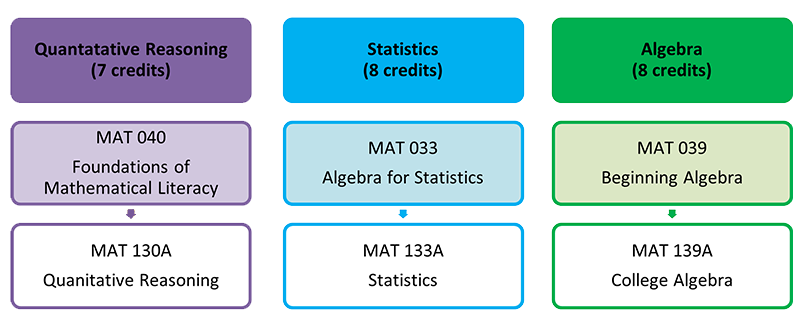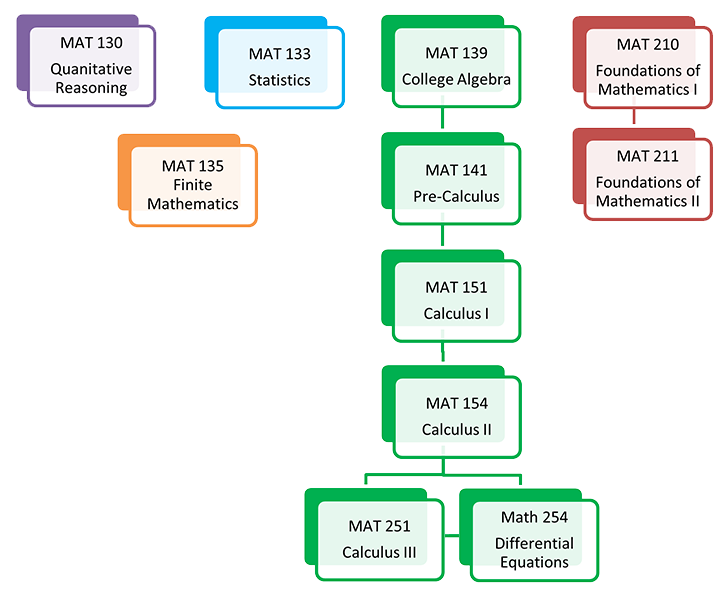Mathematics Course Sequences
It is important to consider current placement as well as future degree requirements when selecting a math course from one of the pathways.
- Each student must consult an academic advisor to select math courses based on the math pathway that is appropriate for the degree he or she is pursuing.
- Upper-level mathematics courses offered at Jackson College have prerequisites. All of the prerequisites must have been completed or placement tests must have been taken within the last two years. The student must have earned a grade of 2.0 or better in a course to proceed to the next course.
- All math courses use technology appropriate to the course.
Co-Requisite Courses
Co-Requisite courses allow students to earn college level math credit for MAT 130, 133 or 139 while also receiving addition support in MAT 040, 039, or 033.

Stand-Alone Courses
Stand-Alone courses are for students who test or place at the MAT 130 level or above.

| Course # | Course Name | Credits | Prerequisites | Notes | |
|---|---|---|---|---|---|
| MAT 033 | Algebra for Statistics | 4 | MAT 020* | ||
|
As an alternative pathway toward college-level mathematics, this course introduces fundamental algebra concepts within an underlying framework of statistics and mathematical modeling based on real-world data. Major concepts and themes include: problem solving and experimental design; unit analysis and error in measurement; dimensional analysis and scientific notation; representing data and coordinate graphing; introduction to basic descriptive statistics and probability theorems; basic geometric principles (area, volume, perimeter); arithmetic operations on numbers, ratios, summations, and percents; solution and manipulation of formulas; modeling relationships (linear and exponential regression); solving equations and inequalities; and function arithmetic and graphing. Appropriate technology includes a graphing calculator. The mathematics department recommends that the prerequisite not be more than two years old. If the prerequisite is more than two years old, then the recommendation is that the course placement exam be taken or the prerequisite be retaken to ensure the success of the student. |
|||||
| MAT 039 | Beginning Algebra | 4 | MAT 020* | ||
|
Students will build algebraic skills working with linear and quadratic expressions and equations. The course particularly emphasizes graphs and equations of lines, factoring techniques, and methods of solving quadratic equations. The mathematics department recommends that the prerequisite not be more than two years old. If the prerequisite is more than two years old, then the recommendation is that the course placement exam be taken or the prerequisite be retaken to ensure the success of the student. |
|||||
| MAT 040 | Quantitiative Reasoning Fundamentals | 4 | |||
|
Quantitiative Reasoning Fundamentals provides extra support for students concurrently enrolled in MAT 130 Quantitative Reasoning. The course will review mathematical topics needed to be successful in MAT 130, and will offer students the opportunity to review, ask questions, and receive extra help with the content of MAT 130. |
|||||
| MAT 130 | Quantitative Reasoning | 4 | MAT 030 | ||
|
Quantitative Reasoning develops student skills in analyzing, synthesizing and communicating quantitative information. Cultivates algebraic reasoning and modeling skills through a quantitative literacy lens. Emphasizes critical thinking and the use of multiple strategies in applied contexts. Topics include proportional and statistical reasoning, probability, and evaluation of bias and validity. |
|||||
| MAT 133 | Introduction to Probability & Statistics | 4 | MAT 033* or MAT 131 or higher | ||
|
This course is an introduction to experimental design, data representation, basic descriptive statistics, probability theorems, frequency distributions and functions, binomial and normal probability distributions and functions, probability density functions, hypothesis testing, statistical inference, Chi-square analysis, linear regression, correlation and application of the above in making informed, data driven decisions in real-world contests. Both graphing calculators and computer-based statistical software will be used. If the prerequisite is more than two years old, then the mathematics department recommends the course placement exam be taken or the prerequisite be retaken to ensure the success of the student. |
|||||
| MAT 135 | Finite Mathematics | 4 | MAT 035 or MAT 131* or higher | ||
|
This course is for student whose programs do not require trigonometry (or the Calculus sequence). The topics included are linear, exponential, quadratic, polynomial and logarithmic functions and models: systems of linear equations; linear regression; mathematics of finance and financial modeling; matrices, linear programming; permutations; combinations, probability theory; probabilistic simulations; decision theory; descriptive statistics; and Markov chains. The mathematics department recommends the pre-requisite not be more than two years old. If the pre-requisite is more than two years old the recommendation is the course placement assessment be taken or the prerequisite be retaken to ensure the success of the student. |
|||||
| MAT 139 | College Algebra | 4 | MAT 039* | ||
|
Algebraic functions, graphs and models are addressed. Emphasis is placed on the following function types: polynomial, exponential, logarithmic, rational and radical. In all topic areas, covered content includes simplifying expressions, solving equations, graphing using transformations, mathematical modeling and problem solving. |
|||||
| MAT 141 | Pre-Calculus | 5 | MAT 139* | ||
|
This course’s major emphasis is on the concept functions. Study polynomial, rational exponential, logarithmic, trigonometric and inverse trigonometric functions, their properties, graphs and related equations and applications. Additional topics include systems of equations, matrices and conic sections. A graphing calculator is required and used extensively. The mathematics department recommends the pre-requisite not be more than two years old. If the pre-requisite is more than two years old, the recommendation is the course placement exam be taken or the pre-requisite be retaken to ensure the success of the student. |
|||||
| MAT 151 | Calculus I | 4 | MAT 141* | ||
|
First calculus course for business, mathematics, engineering and science students explores introductory plane analytic geometry, the derivative, the integral and their applications for algebraic, trigonometric, exponential and logarithmic functions. The mathematics department recommends that the prerequisite not be more than two years old. If the prerequisite is more than two years old, then the recommendation is that the course placement exam should be taken or the prerequisite be retaken to ensure the success of the student. |
|||||
| MAT 154 | Calculus II | 5 | MAT 151* | ||
|
This course explores the following topics: methods and applications of the derivative and integral for inverse trigonometric and hyperbolic functions, indeterminate forms, series and polar/parametric representation of functions. Graphing calculator required. The mathematics department recommends the pre-requisite not be more than two years old. If the pre-requisite is more than two years old, the recommendation is the course placement exam be taken or the pre-requisite be retaken to ensure the success of the student. |
|||||
| MAT 210 | Foundations of Mathematics I | 4 | MAT 131* | ||
|
This course provides background material for students preparing to teach at the elementary level and emphasizes the structure and properties of the number system. It also covers concepts, models in algorithms for whole numbers, integers, fractions, decimals and percents. Some additional hours of on-site field work may be required. The mathematics department recommends that the prerequisite not be more than two years old. If the prerequisite is more than two years old the recommendation is the course placement exam be taken or the prerequisite be retaken to ensure the success of the student. |
|||||
| MAT 211 | Foundations of Mathematics II | 4 | MAT 210 | ||
|
This course will provide the second semester of math content for elementary education majors. It is a continuation course for MAT 210, Foundations of Mathematics I. Topics include probability and statistics, geometry and measurement. The mathematics department recommends that the prerequisite not be more than two years old. If the prerequisite is more than two years old then the recommendation is that the course placement exam be taken or the prerequisite be retaken to ensure the success of the student. |
|||||
| MAT 251 | Calculus III | 4 | MAT 154 | ||
|
Course topics include the calculus of vector-valued functions, multivariable functions and vector fields. Solid analytic geometry and applications of the material are embedded throughout. Use of a computer Algebra System is integrated into the course. Technology Note : Students need to bring a laptop computer to all classes. This computer must meet the minimum system requirements for Maple: https://www.maplesoft.com/products/system_requirem ents.aspx Note: Chromebooks and other tablets are not sufficient. |
|||||
| MAT 254 | Differential Equations | 4 | MAT 154 | ||
|
In this course, students will explore solutions of first order differential equations, linear differential equations, with constant coefficients, variation of parameters, series solutions, Laplace transforms, eigenvectors and eigenvalues and application to solution of systems of linear first order equations. Use of a computer Algebra System is integrated into the course Technology Note: Students need to bring a laptop computer to all classes. This computer must meet the minimum system requirements for Maple: https://www.maplesoft.com/products/system_requirem ent.aspx. Note: Chromebooks and other tablets will not work. |
|||||

